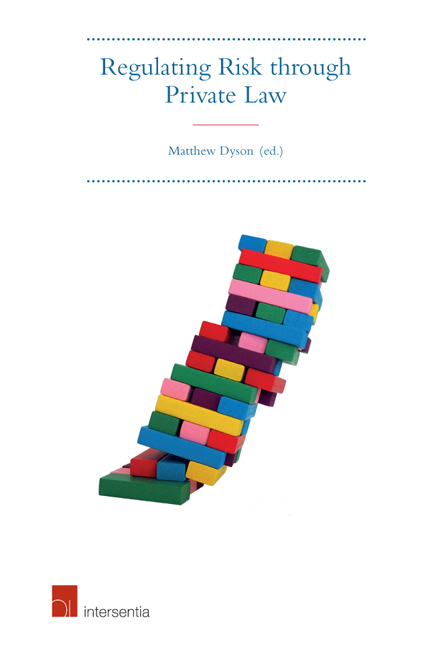Book contents
- Frontmatter
- Preface
- Contents
- Table of Cases
- List of Contributors
- Chapter 1 Introduction
- Part I Risk Overviews
- Part II State of the national art on risk
- Chapter 11 Legal Risk in International Commercial Disputes
- Chapter 12 Medical Accidents and Pharmaceutical Product Liability in France
- Chapter 13 Bearing and Sharing Risk in the Swedish Welfare State
- Chapter 14 Modernisation and Risk Regulation in the Italian Food Sector
- Chapter 15 Motor Vehicle Accidents Caused by Game Wandering onto Spanish Roads
- Chapter 16 Dutch Tort Law at the Crossroads: Judicial Regulation of Health and Environmental Risks
- Chapter 17 Sub Terra: Risk in the Chilean Mining Industry
- Chapter 18 Constitutionalising Rights and Reacting to Risk in South Africa
- Chapter 19 Regulating Risk in Brazil: Resort to General Clauses
- Chapter 20 What does Risk-Reasoning do in Tort Law?
- Chapter 21 Epilogue: What does Risk-Reasoning Tell Us about Tort Law?
- Index
- About the Editor
Chapter 18 - Constitutionalising Rights and Reacting to Risk in South Africa
from Part II - State of the national art on risk
Published online by Cambridge University Press: 13 October 2018
- Frontmatter
- Preface
- Contents
- Table of Cases
- List of Contributors
- Chapter 1 Introduction
- Part I Risk Overviews
- Part II State of the national art on risk
- Chapter 11 Legal Risk in International Commercial Disputes
- Chapter 12 Medical Accidents and Pharmaceutical Product Liability in France
- Chapter 13 Bearing and Sharing Risk in the Swedish Welfare State
- Chapter 14 Modernisation and Risk Regulation in the Italian Food Sector
- Chapter 15 Motor Vehicle Accidents Caused by Game Wandering onto Spanish Roads
- Chapter 16 Dutch Tort Law at the Crossroads: Judicial Regulation of Health and Environmental Risks
- Chapter 17 Sub Terra: Risk in the Chilean Mining Industry
- Chapter 18 Constitutionalising Rights and Reacting to Risk in South Africa
- Chapter 19 Regulating Risk in Brazil: Resort to General Clauses
- Chapter 20 What does Risk-Reasoning do in Tort Law?
- Chapter 21 Epilogue: What does Risk-Reasoning Tell Us about Tort Law?
- Index
- About the Editor
Summary
INTRODUCTION
Building on the overview of South African private law and risk, particularly delict, set out in Part I (Ch. 9), this part explores a narrower topic, namely the constitutionalisation of rights and risk. In particular, it examines appeals to fundamental rights and consequent reactions to risk (1) by the courts engaging in substantive and procedural legal reform, and (2) by litigants responding by suing in delict for negligent risk creation and settling novel claims where they would not have before. In short, constitutional rights and values, which are conceived by the South African courts as a guiding light for applying private law, have provided an impetus for the judicial expansion of civil liability for negligent endangerment.
Three key legal developments have taken place since 2011:
1. First, in Lee v. Minister for Correctional Services the Constitutional Court reformed the element of factual causation in delict so as to introduce the possibility of liability for negligently exposing another to a risk of harm, where that harm ultimately eventuates. Consequently, in Lee, prison authorities were held delictually liable for negligently failing to reduce the plaintiff's risk of contracting pulmonary tuberculosis while he awaited trial in Pollsmoor Prison.
2. Second, the same Court held in Mankayi v. AngloGold Ashanti Ltd that statutes establishing no-fault, social insurance schemes to compensate mineworkers who contracted occupational diseases, including silicosis and tuberculosis, do not bar concurrent delictual claims against their employers, contrary to mining industry expectations.
3. Third, the courts have developed the common law to permit class actions on the basis of their ‘inherent power to protect and regulate their own process … taking into account the interests of justice’. A class action may proceed to a trial only after a court has granted permission (that is, has ‘certified’ the class action).
As a direct result of these reforms, several groups of current and former mineworkers suffering from pulmonary tuberculosis and silicosis, and surviving dependants of such mineworkers, have claimed delictual damages against employer mining companies. The claimants argue that the employers'negligence either caused the diseases in question or wrongfully increased the risk thereof. In March 2016, AngloGold Ashanti Ltd, a gold-mining company, reached a settlement with over 4,000 claimants suffering from dust-related lung illnesses, agreeing to pay R464m (approx. £28m) into an independent trust tasked with distributing compensation.
- Type
- Chapter
- Information
- Regulating Risk through Private Law , pp. 419 - 436Publisher: IntersentiaPrint publication year: 2018



